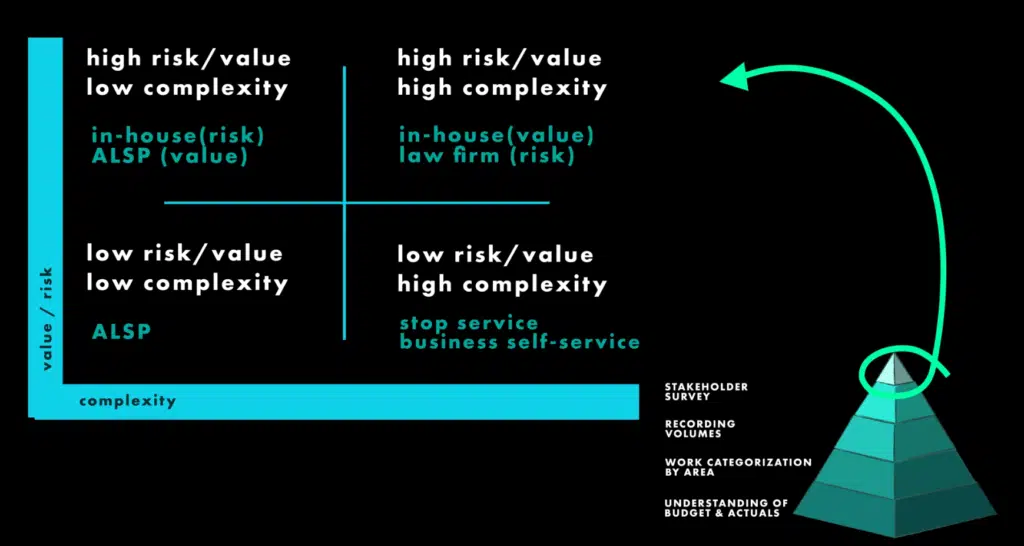Concepts and acronyms used in legal ops can sometimes be confusing for those entering the field. Here’s a brief explanation of what an ALSP is and why you would use one.
The term ALSP is short for Alternative Legal Services Provider – a legal services firm with a different set-up, structure and approach compared to a law firm.
While ALSPs often offer temporary staffing as part of their business model and will likely use or offer legal technology within their wider solutions, the determining factor of an ALSP is the ability to offer managed legal services to clients.
WHY USING AN ALSP IS A GOOD IDEA
ALSPs employ qualified lawyers but they are set-up like a business and do not have a partnership structure, meaning they are more agile and cost-efficient.
ALSPs rely on a legal ops skillset which includes business analysts, project managers and legal technology – they aim to remove complexity and improve process wherever possible.
ALSPs focus on allocating work to the right mix of legal resources in the right locations, meanging the optimal delivery team is allocated considering both quality and cost.
ALSPs do not normally bill on an hourly rate basis, giving clients more cost-certainty.
WHEN SHOULD I USE AN ALSP?
When deciding whether legal work should stay in-house or be delivered externally, make sure you consider the risk or value of the work alongside the legal complexity of the work. On this basis, the matrix diagram below gives a high-level view of the types of legal work suited to in house-delivery, law firms and ALSPs.

For example, in the top right-hand corner where there is high risk or value combined with high complexity, the most appropriate approach is probably to use either a law firm or in-house lawyers. By the same token, in the bottom left-hand corner where there is low value/risk and low complexity, the work can be outsourced to an ALSP instead of being undertaken by more expensive resources either in-house or at a law firm.
TYPES OF WORK
In principle, any volume legal work that has a repeatable nature can be undertaken by an ALSP. If it can be playbooked, it can be outsourced.
Document extraction projects
These are normally projects where high volumes of legal documents require information extracted from them along with analysis which requires trained legal resources. Examples of these types of projects include:
- Due diligence pre-acquisition
- Risk mitigation post-acquisition
- Risk mitigation in relation to regulatory change
- External and internal audits
- Preparation of legacy contract data for a new Contract Lifecycle Management (CLM) system
Contract negotiation as a service (CNaaS)
ALSPs can take on the end-to-end negotiation of contract terms and conditions from the point of demand by the business through to signature and filing. This can either be on a project basis (e.g. a repapering exercise in response to regulatory change) or on a longer term outsourced basis where the ALSP takes over the work of an existing in-house team (e.g. in relation to lower value sales contracts).
The ALSP normally undertakes this type of work by agreeing a negotiation playbook with their client which would include multiple positions per clause.
Outsourced corporate secretarial tasks
Many large corporates wish to retain overall management of their corporate entities whilst outsourcing the administrative tasks surrounding annual maintenance of a large number of legal entities globally.
Outsourced global trademarks renewal
The process of renewing high volumes of trademarks around the world is largely administrative and so ALSPs are often more cost effective than law firm or in-house delivery.
Ready to work with an ALSP? Let’s discuss what solution is best for you!







